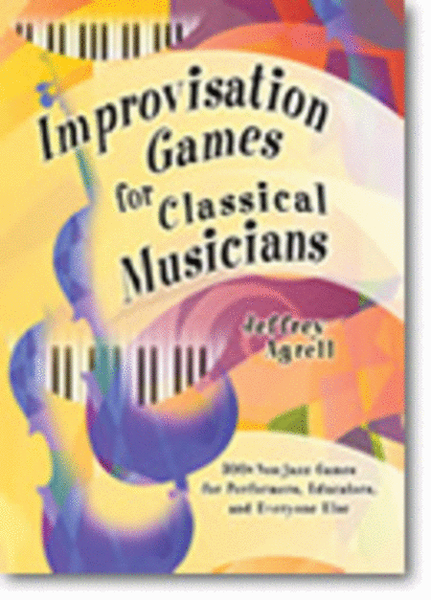Improvisation Games for Classical Musicians
500+ Non-jazz Games for Performers, Educators, and Everyone Else
-
Ships in 1 to 2 weeks
Description
SKU: GI.G-7173
500+ Non-jazz Games for Performers, Educators, and Everyone Else. Composed by Jeffrey Agrell. Instructional. 372 pages. GIA Publications #7173. Published by GIA Publications (GI.G-7173).ISBN 9781579996826. English.
500+ Non-jazz Games for Performers, Educators, and Everyone Else Why don’t classical musicians improvise? Why do jazz players get to have all the fun? And how do they develop such fabulous technique and aural skills? With these words, Jeffrey Agrell opens the door to improvisation for all non-jazz musicians who thought it was beyond their ability to play extemporaneously. Gently, step-by-step, Agrell leads through a series of games, rather than exercises. The game format takes the pressure off of classically trained musicians, steering them away from their fixation on mistake-free performance and introducing the basic concepts of playing with music itself instead of obsessing over a perfect rendition of a written score. Agrell draws a startling analogy with sports that illustrates the absurdity of the traditional approach to classically-oriented music performance: Imagine if basketball were played the way we perform music today.... The greatest games would be recorded and aspiring players would be required to learn a pro’s every move by reading a description of each move from a written chart. Nothing unplanned or unknown would be allowed to happen. No invention in the moment. No individual expression of ideas. No risking a series of less-than-perfect moves for the sake of imaginative play. Starting with simple scale fragments, Agrell shows the way to break this artificial way of thinking about music making with an innovative approach to the business of creating melody, harmony, and rhythm, while working in tandem with others. This extensive collection of 566 games is for anyone and everyone who wants to learn to improvise, but has been afraid to try. Improvisation Games for Classical Musicians can be used by solo individuals, groups from two to sixteen or more, and in classroom settings. Jeffrey Agrell teaches horn, directs the Horn Choir, coaches chamber music, and performs in the Iowa Brass Quintet at the University of Iowa. What is being said about Improvisation Games for Classical Musicians? Jeffrey Agrell's Improvisation Games for Classical Musicians is one of the most inspiring and innovative books I have come across since reading John Steven's revolutionary Search and Reflect fifteen years ago...For those musicians who have never improvised, Agrell provides a huge number of easily accessible and comprehensible ways to get involved with the process...The book is a real "must read" for music educators (either in private tuition or in ensemble settings) who want to open up their students' understanding of the real creative possibilities of music. It will be equally useful to any musicians of any level of experience who wish to expand the creative and expressive range of their playing. —Jared Burrows, PhD Resonances: Exploring Improvisation and Its Implications for Music Education Improvisation Games for Classical Musicians by Jeffrey Agrell is an amazing contribution to both the education and enjoyment of all who are interested in musical performances of any kind. The design, the content, and especially the manner in which Agrell has presented his wildly creative materials is brilliant. Add to that the fact that what this book addresses is the most neglected and perhaps the most important aspect of classical musical growth. With this book teachers and performers alike have a wide open door to years of exploration and learning in how to express themselves through their music and free themselves from a total dependance on the printed page and the deeply ingrained traditions of the classical music traditions.... —Douglas Hill, Professor of Music University of Wisconsin-Madison .

 Share
Share